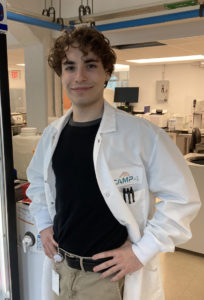 Chris Jurcisin is in his 3rd-year here at Northeastern and is enrolled in thebiochemistryprogram. Learn more about Chris’ successful first co-op with a start-up pharmaceutical company here in Boston.
Chris Jurcisin is in his 3rd-year here at Northeastern and is enrolled in thebiochemistryprogram. Learn more about Chris’ successful first co-op with a start-up pharmaceutical company here in Boston.
1. Tell us about yourself.
My name is Chris Jurcisin, and I am a 3rd-year biochemistry major. I chose this major because I have always been fascinated by life and its workings. In addition, I am a big nature buff; I’ll take any opportunity to go out and enjoy nature, from back-country hiking to practicing archery in the woods by my house; you can usually find me outside. An appreciation of nature from a young age seeded an interest in biology. A natural affinity for chemistry made Biochemistry seem like a logical choice and one I could find the motivation to study.
Beyond the back-country hiking and archery that I mentioned, other hobbies that you could find me doing in my free time include working out at the gym, bicycling, and reading/watching Science fiction.
2. What led you to apply for this co-op?
Whereas many of my fellow biochemistry majors are pre-med, I am not. I knew I wanted to do some form of research; molecular biology research would be engaging and fulfilling. In Boston, pharmaceutical companies are everywhere, so they seemed like a natural choice. Camp4 was a smaller start-up, meaning I would have more flexibility in what I would learn and a more closely-knit company culture, both of which appealed to me. Finally, the position I applied to was on the CRISPR team. This was a technology I was familiar with and was excited to work with. From there, Camp4 seemed like a no-brainer to apply to.
3. How has your co-op changed your perception of your field of study?
My co-op reassured me that this kind of line of work and field of study was one I was interested in. My coworkers were nice, fun people with a good work/ life balance, and I really enjoyed what they did. I found my work engaging and was always interested in the research I was conducting. I learned very cool niche biology from my co-op, and my excitement towards my work reaffirmed my choice of major.
4. What are some of your day-to-day responsibilities with your co-op?
Since it was a start-up, I had a range of responsibilities during my day-to-day work. I was tasked with maintaining cell culture. These immortal human cancer lines could be used as models for drugs and produce proteins and viruses as needed. I would use some of these lines for other experiments to make the Lenti virus (a modified nonreplicating HIV). I was also tasked with running multiple experiments on liver cells, the details of which I can’t really talk about due to an NDA.
5. What skills have you learned during your co-op that you can apply to your education and life?
Much of the science regarding gene regulation has been directly applicable to multiple classes this semester. Since a lot of the biology from the research was very niche, I have a specific understanding of these concepts beyond what would be taught within the scope of a class. Also, mastering basic lab skills has benefited labs this semester. Outside of the classroom, I gained insight into the corporate work environment. While I have worked multiple other jobs, my co-op resembled what I want to do as a career. Learning about that kind of work environment and interacting with coworkers whose positions I would like to be in at some point in my career was very useful.
6. What is your favorite thing about your co-op?
This may be an uncommon answer, but the people I was working with. The science was fascinating, and I learned much about my field of study. But at the end of the day, a job is 40 hours of your time a week, and working with others who you get along with makes those 40 hours much more enjoyable. In particular, I got close with my supervisor and a fellow co-op. I am still in contact with multiple people who can act as connections and friendly faces in my future career. I am returning to the same co-op with the great people at my job and the exciting science.
7. Any advice for someone looking to apply for a co-op?
Going off the last question, I would look into company culture and how the people you’ll be working with enjoy their job. The experience is significant, but at the end of the day, it is six months of a full-time job. Make sure you see yourself being happy there, which will make the work experience more valuable. Also, don’t undervalue your time! A co-op is meant to be an entry-level experience for your future career, but your time is still valuable. Ensure you feel adequately compensated for what you bring to the table. Finally, take the good and the bad as constructive learning. I had a great time at my co-op, but if I discovered that this field differed from what I wanted to pursue, it would also be successful. A co-op is about exploring your future, and any insight is valuable.

